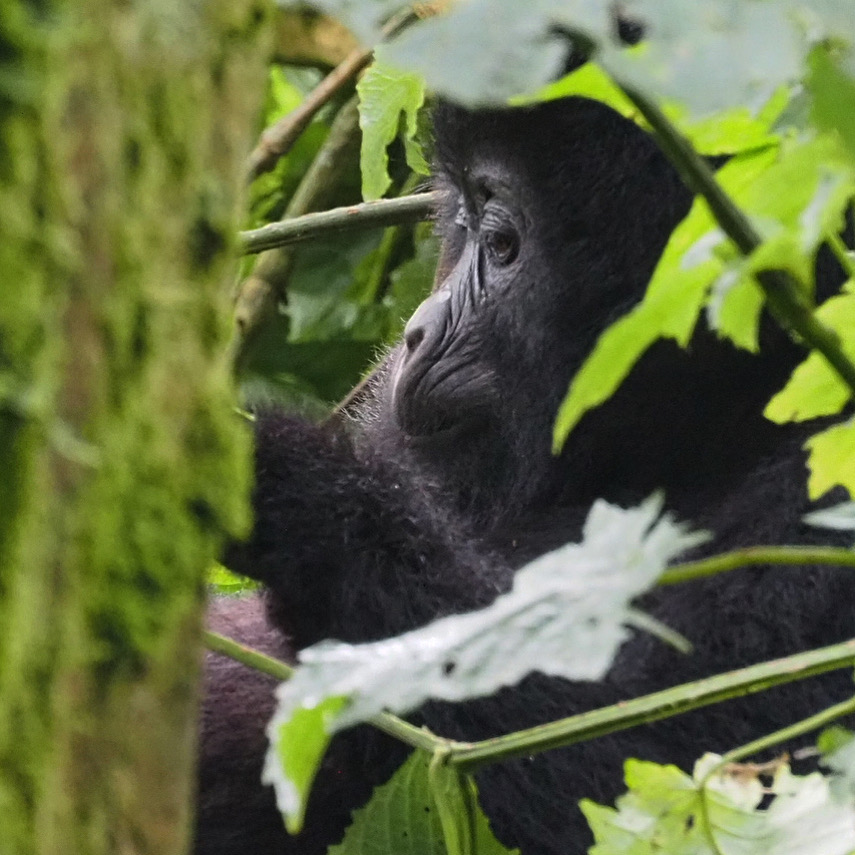
A silverback gorilla announced itself by thrashing around in a bush, and while we couldn’t see the Big Boy we watched one of the local trackers skedaddle backwards onto his butt after a loud warning growl.
We had penetrated, just, the Bwindi Impenetrable Forest National Park, part of the world heritage listed mountain gorilla bio-reserve shared by Uganda where Bwindi sits, Rwanda (Volcano National Park) and the Democratic Republic of Congo (Virunga National Park).
As habitat of the 1006 remaining mountain gorillas, the reserve is fragmented by farms, and the parks are lined with volcanoes, some active. There’s civil war on the Congo side with military encroachments.
Meanwhile, this gorilla haven relies on supportive representatives of the three Governments involved, international philanthropic foundations such as the Dian Fossey Fund, and at the moment, high-end tourism. A lot rests on persuading poachers and farmers to make a living from the gorilla visitor business – we met a couple of ex-poachers along the way.
Gorilla tracking is high on many bucket lists, but hard on the wallet. $US1500 for a gorilla permit in Rwanda, $US700 in Uganda and $US450 in DRC which kind of reflects the perceived safety levels of the three countries. That’s $US700 for just one special hour with our 3rd cousins, 320,000 times removed.
The permit system controls visitor numbers to gorilla family groups that are “habituated” – or in other words, used to people. Tourists are kept away from other wild and more unpredictable family groups in case of silverback attack, and cross-contagion with human diseases. The wild population are like a reserve team, protecting the species. When we reached the gorillas we were required to wear masks because of COVID 19 – the only time we were obliged to wear them during the entire trip to and from Africa.
On top of the permit, there’s costs for fancy (and not so fancy) lodges and travel to get to the Parks.
We’d opted for an “easy” trek as we had to be back in Kigali for meetings. This meant a quick drive through to Uganda, a night at the excellent Uchumbi Gorilla Lodge where they deemed the evening cold, so provided us hot water bottles! Then an early briefing next morning at Park HQ at the Rushaga entrance and the trecking.
We skidded for 10 or so kms along a mud-churned, land-slipped road to where our gorilla family was known to be ranging. But there was no direct road into the park. At a village, we picked up a porter and the hike began, with rangers, guards and a younger French couple, walking past almost vertical fields of beans sticks – so the landscape looked like a giant green porcupine – up, up and up. The reserve is surrounded by a growing population of humans too, eager to farm on any arable patch.
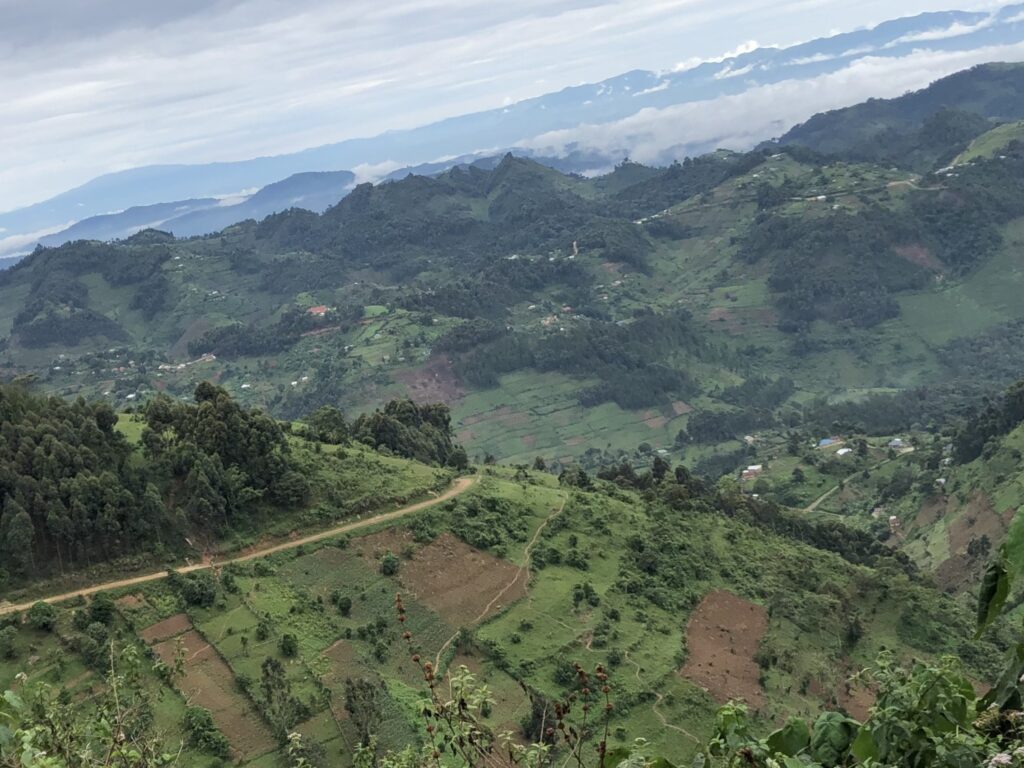
The guides and rangers kept to the steep village road for as long as possible because, being the wet season, as soon as we stepped up onto footpads, there was the twin risk of sloppy mud and gravity. Cyril, a local farmer and our porter ominously explained, “once you start falling down the hill, you don’t stop until you hit the bottom.”
So, tentatively, we cut along the side of a slippery ridge and penetrated the impenetrable. The guides and rangers, armed with large scythes, chopped vines, and at times, we were physically pushed, hand on bum, up the slope by Cyril. I’m a pretty fit walker, but faaark it was hard work, eyes on footholds, using the hiking sticks as leverage to push upwards through the dark green jungle with slips and nears misses as footholds gave way.
Meanwhile trackers were always in touch instructing our team how to find the family. This was rather amazing, that within this large mountain of dense vegetation we beelined towards the apes, with the odd Ugandan version of coo-ee – a kind of whoop – trying to locate the two trackers who keep daylight tabs on a 14-member family group.
Our entertaining ranger-guide, Allen, announced we were comparatively close to the gorillas. Alice said “define comparatively.”
“Five or ten minutes,” Allen said, and she added, “if that is a suitable definition of ‘comparatively’.”
And five to ten minutes later the silverback was racketing in a thicket, and we were there – in this isolated forest with the gorillas.
The guides knew their biz. They helped us position ourselves for observation and photography, and would bend back or chop vegetation with their long stick-sickles to clear the sight lines. I was thinking, jeez there’s a lot of vegetation chopping going on, when suddenly the silverback moved to a nearby three-metre tree fern that looked exactly like the Aussie Dicksonia Antarctica, and started shaking it. The giant plant collapsed with a thump in front of us. I laughed. The Boss had shoved it over with all 200 kilos of his weight. He then sat and contentedly chewed and sucked the new fern fronds that had been pronging from the top, making a juicy red mess in his mouth, and dropping the chewed-up stalks on his ample belly.
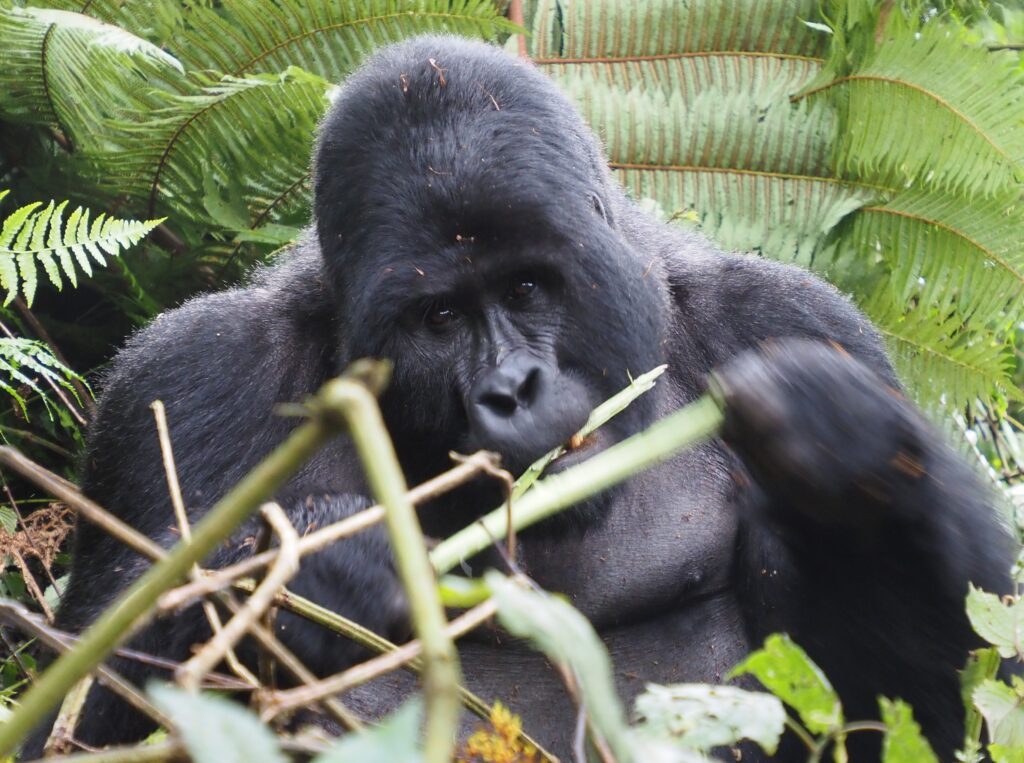
Ah well, volcanic soil, plenty of rain. There’d be more giant tree ferns. Two of his kids were feeding in a tree above him – they’d moved a bit closer to dad on our arrival.
Dad kept chomping.
“He has to eat 25 kilos of salad a day to keep up his body weight,” said Allen.
The Boss was sucking his fern fronds and observing us. You’re not supposed to lock eyes with a 200 kilo silverback, but he kind of invited it. This exchange was certainly not how you and your dog regard each other (this may have been writ before, but it’s true) with the gaze of mutual fondness and, on the dog’s part, yearnings for a treat.
No, with Big Boy there was a deal of appraisal going on, plus a slight boredom with all the attention. No doubt the gorillas well know that the humans stay for a short time with beeping cameras and smart phones, oohs and ahhs and the associated vine chopping.
These pesky people will be gone soon, he may have thought (tho’ I don’t really want to put words into the big boy’s head, I’m sure he also thought “those masks look weird – where are their mouths?”). I pondered the cloud of insects misting around him and thinking, you poor bugger, what a swarm, but I suppose humans are something of a swarm as well.
Gorillas are smart. They can even outwit poachers. Not bothered by global politics, crypto-currency, shoe-sizes, the price of petrol, nor the Kardashians. Instead of cropping or shopping, they just forage for “salad” and make nests for the night, and the big males look out for the family group.
The two youngsters were playing close to the silverback as they generally do for safety, and he warned them with a grunt once or twice not to get too close to us.
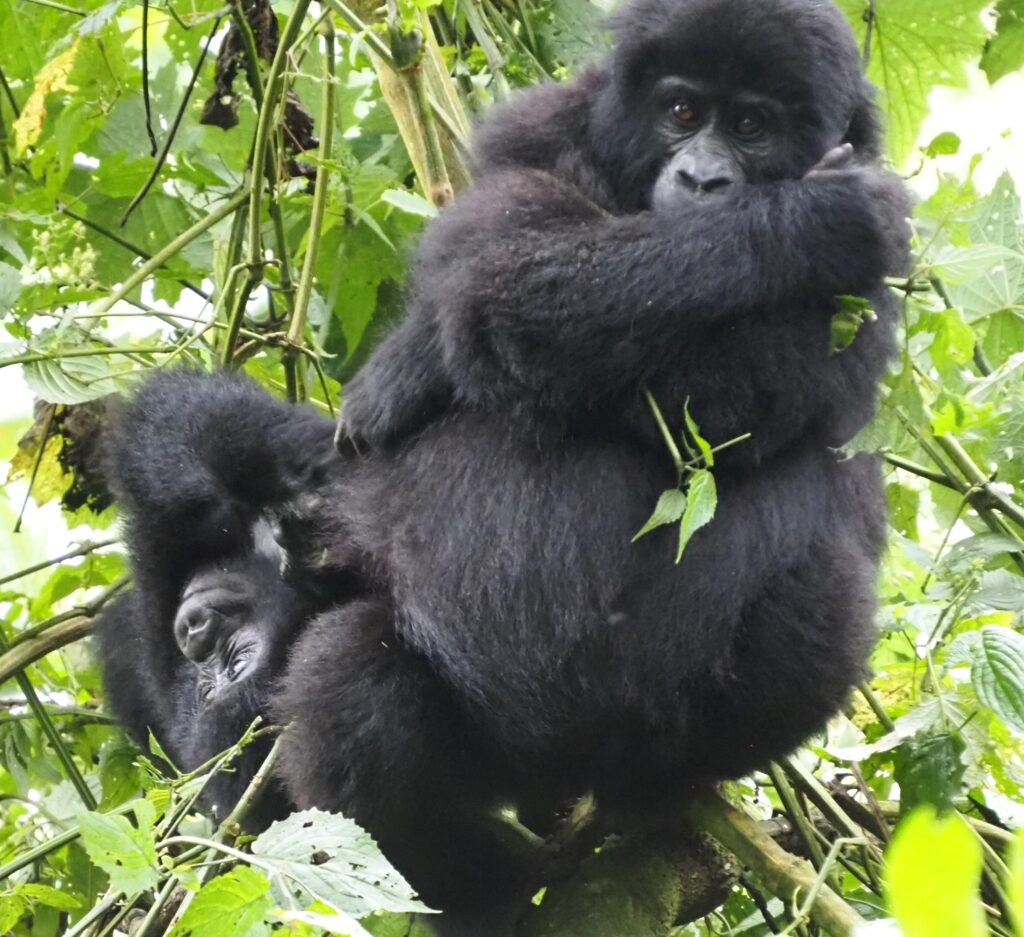
The youngest was teasing its older sibling, as little siblings do, until the teasee had enough and disappeared into the bush. The younger one plummeted from a branch in the older one’s direction.
Then it started to rain, right at the end of the sacred hour of communing. We’d had a good dry 58 minutes, which seemed much longer, watching the lovely hairy rellies. Gorillas hate rain – something else we have in common. Big boy turned around and bowed to protect his fur-free face from the downpour, until all that was visible was his silver back.
Now it was time to descend the wet, vertiginous bean fields, generously tip the porter (Cyril’s attention to the track was the only thing that got us there), get temperature checked for Ebola virus on the Rwandan border, and find a hot bath.
Rwanda is locking gorillas into their national culture – our friends at the Urban Dance School at Club Rafiki in Kigali performed an elegant, large-scale contemporary/hip hop opener at this year’s annual Gorilla Naming Ceremony, a huge annual celebration where all Rwandan born gorillas from that year are officially recognised.
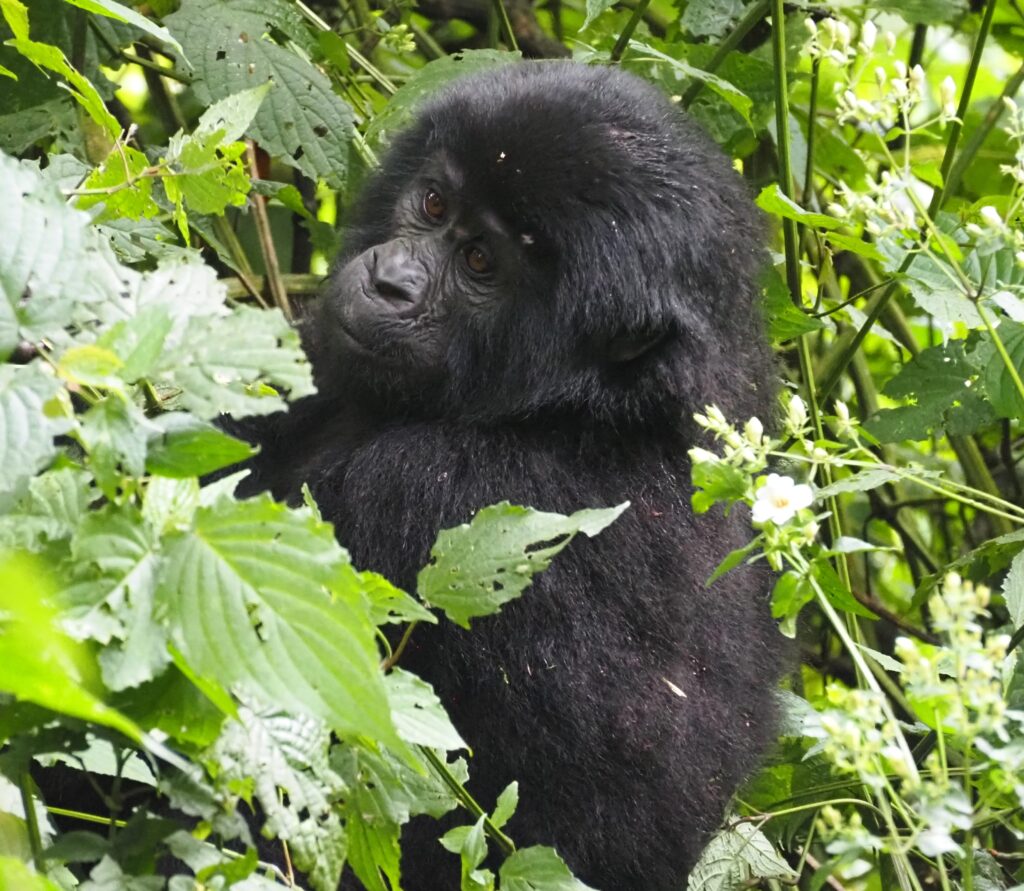
There’s a silverback on their 5000 franc note. Uganda too, is building a fairly advanced tourism structure around the apes. Congo alas, is less focused.
Good news is, the mountain gorilla population is slowly growing with persistent support and protection, but they remain much fewer in numbers than their lowland gorilla cousins. It’s still touch and go.